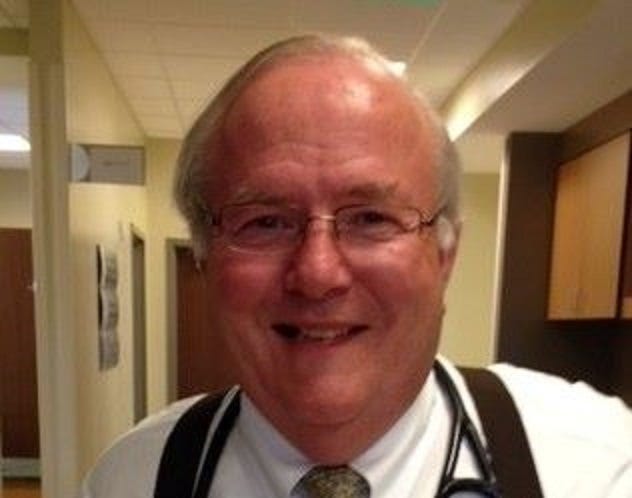In 1990, I had a serious illness called large cell lymphoma which is a fast-growing highly malignant tumor of the lymph glands. I was an internal medicine doctor in practice by myself. One son had just started college. The other would start in a couple of years. I told the oncologist, “I can’t fool around, I need to know what this means because of the situation that I just described. He said simply, “You will be cured or dead in 6 months.” Everything was different in an instant. Priorities changed.
By that time, I had already been practicing internal medicine in the community for 14 years. Internists generally see older, sicker patients and I had been there for lots of people who had heard news like that. Many of them became preoccupied with the diagnosis and it seemed to dominate their lives to the extent that they stopped living. They might as well have died then and there. I made up my mind that I was not going to die until I was dead and that I would live each day as normally as I could. That is what I did. I had major surgery with an abdominal incision from my breastbone to my pubic bone to remove my spleen and several lymph nodes. One week after my surgery, I was back in the office seeing patients half days. I continued to do that thoughout my treatments.
Those were hard days. Vincristin was part of my chemotherapy and it causes nerve damage. I complained to my oncologist that my hands and feet were becoming numb. She smiled and said, “Talk to me when you can’t button your shirt.”
When I was in medical school, we could do an internship for a few months in a specialty we would not pursue. I did three months of internship in psychiatry. Depression is always likely with a major stress like this, but I had heard the faculty talk about “the tape in your head.” During the course of a day after a diagnosis like this there is a stream of thought that is natural. “Why did this happen to me? This is so unfair. I didn’t do anything to deserve this. I don’t drink. I don’t smoke. That chemotherapy is so horrible. It makes me so weak. I feel awful.” That stream of thought is depressing. It increases the stress. It is a glass that is half empty.
But you CAN change the tape! In that same setting, I worked on changing the tape to something like this: “They did say that I have an 80% chance of being cured by the chemotherapy. Radiation adds 5%. I will follow that as faithfully as I can. I don’t want to wake up 2 years from now with a return of the cancer and wonder, what if I had had radiation? My patients and friends are sticking with me. My colleagues are taking my night and weekend call. I have a good chance of beating this. Jay has a football game Friday night. I can’t wait to see it. Thank goodness for indomethacin that took away my pain, fever, and sweats right away.” That stream of thought is uplifting, It lessens the stress. It is a glass that is half full.
Changing the tape is not a skill that most of us are born with. It takes practice. But it is definitely worth the effort. Since I was a senior in medical school this science has advanced tremendously. The same discussions today are about mindfulness, meditation, and living in the present. You can change the way the brain functions throughout your life and these efforts change the structure of the brain .(plasticity) This article from Forbes discusses the topic and is an easy read. Depression and anxiety are the leading causes of disability in the world. It is worth our time to understand it better.




Thank you for your personal story. It was approximately 4 weeks ago that Eule and his team from Heartcarecorp.com did an MCG on me. It blew up my world. I was purchasing the device to prevent heart attacks in others--not for myself. As a result of the MCG, I had my partner do some labs and sure enough, I have diabetes contributing to the left sided heart disease the MCG was detecting. I went from angry to depressed to then changing my perspective that this disease is not my identity and it is only defined by how much energy I pour into it or the tapes that attempt to make it my identity. My practice partner battling breast cancer is challenged with the same tapes and she is instead moving forward with great courage to be the victor.
Personally, I have done a 180 degree on how I eat and I have taken Dr Sam Fillingane’s perspective that exercise after age 30 is no longer optional on days that end in Y. I am only 3 weeks into this change, but I fully intend on reversing what was showing up on the MCG and my labs. I have done nearly 100 of these MCGs on my own patients and I am now inviting them to join me on a better path to wholeness and wellness. The heart attack rate in our busy practice of 3000+ will be reduced to 1.2 per year by the end of the next 12 months and I will lead the charge by setting an example. The national average is 7.3 per FP/IM and for this disease state--we intend on being better than average.
Thank you for this personal story.